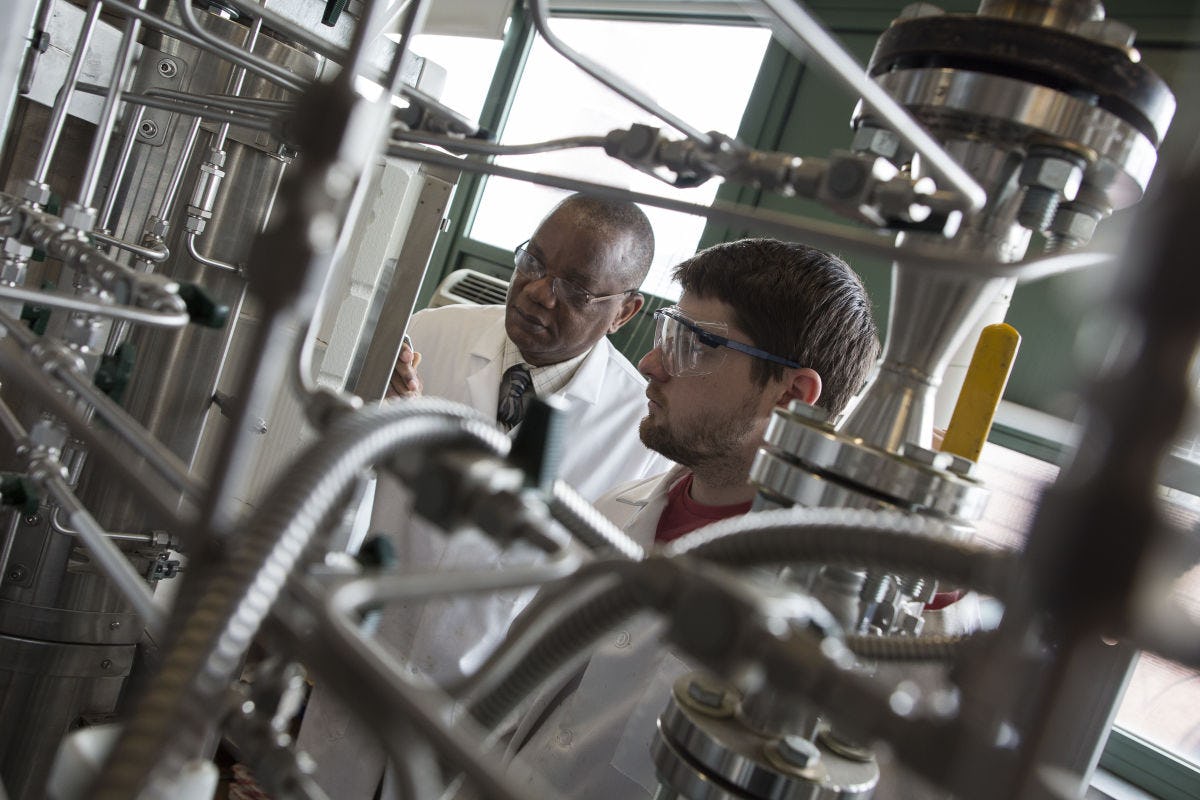Materials Science and Engineering Doctoral Program
Program Details
Degree
Doctor of PhilosophyAvailable
On campusGain the skills to develop innovative, high-performance materials in biomedicine, electronic device processing and many other areas.
The Stevens materials science and engineering Ph.D. program combines a renowned faculty and world-class facilities in a unique environment infused with an entrepreneurial ethos. Here, you’ll have the freedom and resources to pursue the research avenues that interest you most. You’ll graduate primed for success in a broad range of industries that require the design of electronics, alternative energy sources and biomedical solutions. Our alumni are highly sought-after by universities, corporations and government institutions.
The Department of Chemical Engineering and Materials Science offers dynamic opportunities to explore leading-edge research within a close community of faculty mentors. You'll be able to study under a faculty mentor in the area that you find most exciting:
Self-assembly of organic semiconductors for improved solar collection efficiency
Structural and chemical surface modification for antimicrobial surfaces on biomedical devices
Nanostructured optical fibers for thermal energy harvesting and sensing in harsh environments
New battery materials and microstructures for energy storage
The Stevens Advantage: Widen Your Career Options
Outside of the classroom and lab, Stevens offers unique resources to facilitate your professional success. The Chemical and Materials Student Association hosts guest lectures and provides leadership opportunities. Stevens’ location near New York City and the New Jersey pharmaceutical corridor allows students to network with potential employers at scores of organizations, corporations and universities.
Learn more about what makes graduate education from Stevens a unique experience:
Graduate Cooperative Education Program: Available with two tracks, your co-op experience can serve as a starting point for a research project or augment your on-campus research with complimentary experience.
International Student Experience: Tap into our expanding worldwide network of research, academic and alumni partners and mentor with our expert faculty in a number of federally-designated STEM degree programs. Optional Practical Training (OPT) or Curricular Practical Training (CPT) is available to gain work experience in your major/field of study.
State-of-the-Art Research Labs and Facilities: Build, tinker and test your designs in Stevens' MakerCenter, Prototype and Object Fabrication Lab, or numerous other research facilities.
Research Opportunities: Renowned faculty, labs and research centers – as well as industry partnerships and funding from leading national agencies – support strategic and interdisciplinary research in engineering and science.
Assistantships and Fellowships: Stevens offers funding to select graduate students in the form of teaching assistantships, research assistantships and fellowships. Limited in number, these highly competitive opportunities are awarded to exceptional candidates based on merit.
Expanded Learning Options: The Schaefer School offers new opportunities for doctoral students to do coursework at universities in the New York City area – and around the world – through our growing list of academic partnerships with other prestigious universities. Learn more about our latest partnerships.
Hands-On Chemical Engineering and Materials Science Research
At Stevens, you have the ability to join research groups with students at a variety of levels of experience, and outstanding faculty so you can learn cutting-edge technology as a team, just like in the real-world. In our state-of-the-art research labs and facilities, you'll have the opportunity to engage in experiential learning.
Program Admission Requirements
Who Should Apply?
We welcome applicants holding a master’s degree in materials science and engineering (up to 30 credits can be transferred to Stevens’ Ph.D. program).
In exceptional cases, applicants who hold a bachelor’s degree in materials science or a related field but also have a strong background in chemistry or physics may be considered. Most often, however, they will be enrolled in the master’s program first.
Well-qualified candidates will demonstrate a history of scholarly specialization in a related discipline.
Requirements
Bachelor’s or Master's degree, with a minimum GPA of 3.0, from an accredited institution
Transcripts from all post-secondary institutions attended
Two letters of recommendation (academic or professional only; Select Ph.D. programs require a third letter of recommendation)
Statement of Purpose
$60 non-refundable Application Fee
Proof of English language proficiency
A competitive GRE or GMAT score (required)
Resume/CV
Writing sample(s). All applicants are encouraged to submit a lab report (preferable) or paper that they wrote, individually, for an engineering course. Applicants who have published a journal article are also encouraged to submit a copy of their article.
For more complete details, visit our General Admissions Requirements page.
Curriculum Overview
View objectives, outcomes, and other Ph.D. curriculum details in the most recent academic catalog.
View Academic Catalog >
Each Ph.D. curriculum must also adhere to the institution wide standards listed in the doctoral handbook.
View Doctoral Handbook >
If you have existing graduate credits or experience in this area of study, contact [email protected] to discuss opportunities to include it in the curriculum.
Fellowships & Assistantships
Information about assistantships and fellowships can be found here.
STEM Designated Degree Programs
The four fields comprising STEM – science, technology, engineering and mathematics – offer a wide variety of professions that are classified as some of the highest-growing and highest-paying jobs right now and in the future.
And for international students, the demand for STEM-related professionals in the United States can open the door for an extended stay.
An ever-growing list of eligible programs across all levels is available here.
A Tech Forward Education
Materials Science & Eng Ph.D. Facts & Statistics
Related Programs
Chemical Engineering Doctoral Program
Advance independent research that addresses some of society’s biggest challenges in the entrepreneurial environment of Stevens’ chemical engineering Ph.D. program.
Interdisciplinary Programs
The challenges facing today's scientists and engineers often exist at the intersection between various disciplines–whether between engineering and science or fields within individual disciplines. At Stevens, engineering and science come together under one roof, fostering a proactive, interdisciplinary environment that encourages results-driven collaboration and unique, innovative problem solving.



